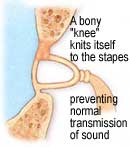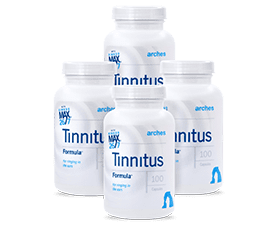By Brent Curtis
Brent Curtis has lived with tinnitus for 30 years and serves as Marketing Director and CEO for Arches Natural Products, Inc.
 There is a growing body of evidence that there exists a link between the female hormone cycles (or the cessation thereof) and the fluctuations in the perception of tinnitus loudness. While the majority of this evidence consists of anecdotal comments by researchers, clinicians and doctors from around the globe, their conclusions support the connection and demands further investigation.
There is a growing body of evidence that there exists a link between the female hormone cycles (or the cessation thereof) and the fluctuations in the perception of tinnitus loudness. While the majority of this evidence consists of anecdotal comments by researchers, clinicians and doctors from around the globe, their conclusions support the connection and demands further investigation.
According to the Royal National Institute for Deaf People (RNID), United Kingdom, “a number of women reported that their tinnitus either started, or became more noticeable, during pregnancy, menopause, or following Hormone Replacement Therapy (HRT).” HRT is the taking of supplements of female sex hormones by women to alleviate menopausal symptoms and to reduce the future risk of osteoporosis and cardiovascular disease.
A worsening or onset of tinnitus may be a consequence of the side effects of HRT, which include fluid retention, depression, headache, dizziness, insomnia, raised blood pressure, and migraine. A 1996 study (1) gave an example of a woman who developed tinnitus and hearing loss in one ear, two days after taking Climaval (oestradiol) as HRT. After the HRT was stopped and she started on steroids, her hearing returned to normal and the tinnitus disappeared. She then began on Premarin with no symptoms initially. Over the next year she had a few episodes of mild hearing loss and intermittent tinnitus, but felt these were minor and not interfering with her lifestyle. In view of this and the advantages of HRT in her situation, she continued taking Premarin.
Other theories suggest that the prevalence of tinnitus associated with both peri-menopause and menopause as well as HRT could simply be due to an age related issue. Tinnitus is experienced more by people in their 60s, 50s and 40s than in any other age group – so tinnitus onset may be coincidental in menopausal women or those receiving HRT, and be more related to age or other factors. It is also theorized that menopausal symptoms such as sweating, hot flashes, and mood changes also affect tinnitus. Even the level of circulating hormones estrogen and progesterone could initiate or worsen tinnitus especially during menopause.
Some women reported that their tinnitus started or became more noticeable during premenstrual syndrome (PMS) (2). Some evidence suggests that artificial progestognes (such as those found in HRT) in order to insure regular cyclical bleeding can cause an exacerbation of the tinnitus.
Pregnancy
In a small survey conducted by the RNID, 27 women described their tinnitus experiences in relation to 40 pregnancies. Most of the women were aged 27 to 39 years. The survey found the following:
|
Incidence of Tinnitus
|
No. of pregnancies
|
During or after pregnancy
|
| Present before pregnancy | 8 (20%) | For 5/8 (62%) tinnitus increased during pregnancy. For 3 it also increased after childbirth and for one it lessened after childbirth |
| Not present before pregnancy | 32 (80%) | 21/32 (66%) were affected: 14 during, 7 after childbirth. For 5 tinnitus increased after birth, for 3 it lessened and for 2 it disappeared. |
While hormonal changes during pregnancy may have an unknown influence upon tinnitus, it is likely that the increased tinnitus awareness in these women was related to other factors that are known to aggravate tinnitus distress.
Fatigue coupled with the emotional stress of having a new infant can heighten tinnitus awareness. A newborn requires lots of attention, usually causing the mother to lose sleep. The sheer adjustment to parenting can also contribute to tinnitus annoyance because of new emotional stress.
Some women experience depression during pregnancy or after child birth. Depression is known to interact with tinnitus and to make matters worse. Some medical treatments and prescription drugs given for depression are known to cause or aggravate tinnitus in some individuals. (3)
Many people with tinnitus are also more aware of the ringing during quiet intervals particularly at night, and it may interrupt or prevent sleep. Mothers who are continually awakened to feed their child during the night might then be more aware of their tinnitus because of the relatively low levels of background sounds along with the fatigue.
 Ear Pathology
Ear Pathology
A condition of the middle ear which can become worse during pregnancy is otosclerosis. Otosclerosis is a disease of bone growth on the small stapes bone in the middle ear that eventually prevents the middle ear bones from conducting signals to the inner ear, resulting in hearing loss
The phenomenon of hearing loss associated with otosclerosis in pregnancy was first noted in 1858. Before the era of stapes surgery, young women with otosclerosis were often advised to avoid pregnancy. Tinnitus is often associated with otosclerosis. A surgical procedure can correct the hearing loss and may reduce tinnitus awareness in this situation. While studies have suggested a possible association between pregnancy and hearing deterioration in patients with otosclerosis, no research exists that shows this association to be as strong as to recommend women with otosclerosis refrain from becoming pregnant. The best approach seems to be operating on women with suspected otosclerosis, if clinically indicated, before they get pregnant and possibly evaluating their hearing post partum. (4)
HRT may also accelerate otosclerosis, creating a progressive conductive hearing loss. This may in turn heighten tinnitus as the internal tinnitus noise becomes less easily masked by external sounds.
There are a number of different brands of HRT drugs, available as tablets or self-adhesive skin patches. As with any drug, it may be that you are adversely sensitive to a particular type or dose and that changing either of these may reduce or eliminate side effects. You should always talk to your doctor about changing any aspect of prescribed medication.
Alternative Treatments
Black Cohosh
Made from the dried rhizomes and roots of a native North American plant, black cohosh is used to treat symptoms of premenstrual syndrome, painful menstruation and menopausal symptoms such as hot flashes, night sweats, nervousness, irritability, sleeplessness and depressive moods. Some studies suggest that black cohosh is equal to or better than hormone replacement therapy in relieving menopausal symptoms, although it doesn’t address the issues of preventing osteoporosis. Its safety in people with risk factors for breast cancer is unknown.
Ginkgo Biloba Extract
Clinical studies have shown that ginkgo extracts exhibit therapeutic activity in a variety of disorders including congestive symptoms of premenstrual syndrome, tinnitus, poor cerebral and ocular blood flow, Alzheimer’s disease, failing memory, age-related dementias. Readers of Quiet Times are well aware of the powerful results that can be obtained for the reduction of tinnitus symptoms by taking proper dosages of Ginkgo biloba extract over time. Arches Tinnitus Formula™ contains the highest quality, naturally grown, premium-grade ginkgo extract found on the world market. It is this superior quality extract that produces superior results.
disorders including congestive symptoms of premenstrual syndrome, tinnitus, poor cerebral and ocular blood flow, Alzheimer’s disease, failing memory, age-related dementias. Readers of Quiet Times are well aware of the powerful results that can be obtained for the reduction of tinnitus symptoms by taking proper dosages of Ginkgo biloba extract over time. Arches Tinnitus Formula™ contains the highest quality, naturally grown, premium-grade ginkgo extract found on the world market. It is this superior quality extract that produces superior results.
A survey on HRT and dietary supplements was conducted of 100 peri- or postmenopausal women at a San Francisco women’s health conference in March 2000. Of the 100 eligible women, 29% used hormone replacement therapy (HRT) alone, 16% used HRT with dietary supplements, 32% used dietary supplements alone, and 13% used no product or used supplements excluded in this survey. The most common dietary supplements were soy (29%), ginkgo biloba (16%), and black cohosh (10%). Those women using a combination therapy of both HRT and dietary supplements reported enhanced improvement in vaginal dryness, libido, and mood compared with those using HRT alone. In fact the perceived quality of life and overall control of menopausal symptoms were highest among women using dietary supplements alone and women using combination therapy, respectively. (6)
- Sudden sensorineural deafness and HRT D Strachan, Jnl of Laryngology & Otology Dec 1996 110 1148-50.
- Royal National Institute for Deaf People.
- PDR Guide to Drug Interactions, Side Effects & Indications for Tinnitus.
- Edward J. Hillman, M.D. Otolaryngologic Manifestations of Pregencancy, February 2, 1995
- McKenna DJ, Jones K, Hughes K.; Efficacy, safety, and use of ginkgo biloba in clinical and preclinical applications. Altern Ther Health Med 2001 Sep-Oct;7(5):70-86, 88-90
- Kam IW, Dennehy CE, Tsourounis C.; Dietary supplement use among menopausal women attending a San Francisco health conference. Menopause 2002 Jan-Feb;9(1):72-8
Get Free Shipping!
Order now and get free shipping on either the Tinnitus Starter Kit or Combo Pack. Try the doctor recommended products with clinically proven ingredients for tinnitus. No coupon code required.

